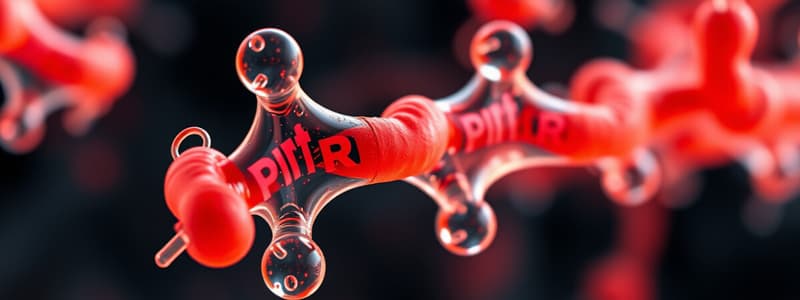Podcast
Questions and Answers
Which of the following are other names for dopamine?
Which of the following are other names for dopamine?
- Adrenaline
- Intropin (correct)
- Norepinephrine
- Epinephrine
What classifications does dopamine belong to?
What classifications does dopamine belong to?
- Opioid
- Adrenergic sympathomimetic (correct)
- Inotropic agent (correct)
- Catecholamine (correct)
What are the therapeutic effects of dopamine at a low dose?
What are the therapeutic effects of dopamine at a low dose?
Dilates renal and mesenteric arteries by stimulating dopaminergic receptors; may reduce BP due to vasodilation.
What indicates the use of dopamine?
What indicates the use of dopamine?
What conditions are contraindications for dopamine administration?
What conditions are contraindications for dopamine administration?
Which are potential cardiovascular side effects of dopamine?
Which are potential cardiovascular side effects of dopamine?
Which are potential gastrointestinal side effects of dopamine?
Which are potential gastrointestinal side effects of dopamine?
What is the recommended concentration for dopamine administration IVPB in adults?
What is the recommended concentration for dopamine administration IVPB in adults?
What should be monitored when administering dopamine?
What should be monitored when administering dopamine?
What should never be administered through the same line as a dopamine infusion?
What should never be administered through the same line as a dopamine infusion?
Dopamine should be discontinued abruptly.
Dopamine should be discontinued abruptly.
What is the pediatric dosing recommendation for dopamine administration?
What is the pediatric dosing recommendation for dopamine administration?
Flashcards are hidden until you start studying
Study Notes
Dopamine Overview
- Also known as Intropin.
- Classified as an adrenergic sympathomimetic, catecholamine, and inotropic agent.
Therapeutic Effects
- Low Dose (1-5 ug/kg/min):
- Dilates renal and mesenteric arteries through dopaminergic receptor stimulation.
- May cause reduced blood pressure due to vasodilation.
- Moderate Dose (5-10 ug/kg/min):
- Increases inotropy; minimal effects on chronotropy.
- Selectively stimulates beta 1 receptors, enhancing cardiac output and blood pressure.
- High Dose (10-20 ug/kg/min):
- Activates alpha receptors, resulting in vasoconstriction.
- Raises blood pressure via stimulation of both alpha and beta receptors.
- Increases inotropy and chronotropy.
Indications
- Effective in treating cardiogenic shock.
- Utilized for vasodilatory shock management.
Contraindications
- Not recommended for hypovolemic shock before fluid resuscitation.
- Avoid in hypotension due to heat stroke.
Side Effects
- Cardiovascular:
- Includes tachycardia, palpitations, various blood pressure changes, chest pain, and potential ventricular irritability.
- Respiratory:
- May cause dyspnea.
- Gastrointestinal:
- Can lead to nausea and vomiting.
Administration Guidelines
- Adults:
- Administer via IVPB with concentrations of 400 mg/250cc D5W or NaCl, starting at 2-5 ug/kg/min.
- Titrate to achieve systolic BP of 90-100 and signs of adequate perfusion; do not exceed 20 ug/kg/min.
- Pediatrics:
- Follow protocols or medical command for mixing concentrations. Start at 1 ug/kg/min and titrate accordingly.
Notes & Precautions
- Standard protocols may require dilution to 200 mg/250cc D5W or NaCl, beginning at 5 ug/kg/min.
- In fluid-restricted adults, a concentration of 800 mg/250cc may be appropriate.
- Potential slight beta 2 and/or alpha adrenergic effects, which are not additive to therapeutic benefits.
- Avoid IVP medications through the same line as dopamine infusion to prevent interactions.
- Sodium bicarbonate must never be administered in the same line as it inactivates dopamine.
- Do not stop dopamine abruptly; taper off the infusion gradually to prevent rapid blood pressure drop.
Studying That Suits You
Use AI to generate personalized quizzes and flashcards to suit your learning preferences.



